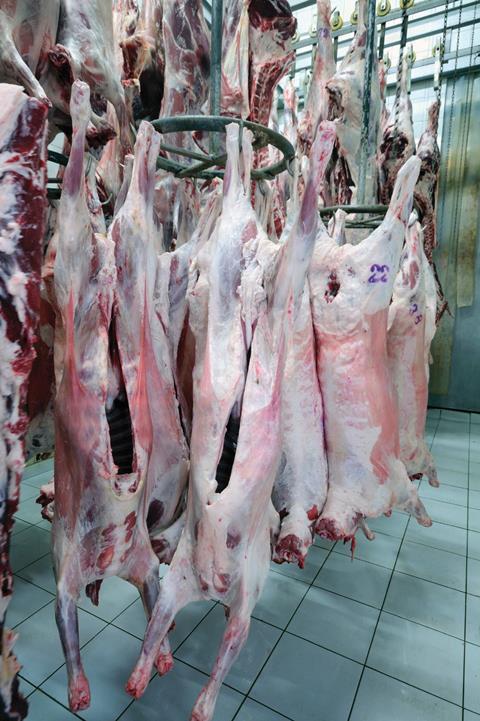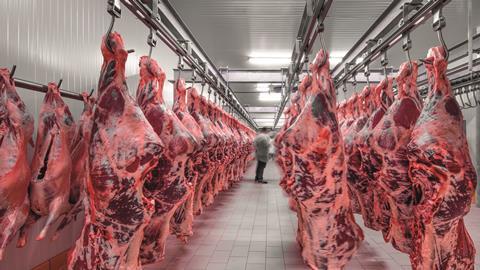Enhanced cutting and processing services are in demand following a series of major abattoir closures across the UK, and machinery and equipment suppliers argue that automation could help ease the current challenges.
Farmers are actively seeking long-term “enhanced processing, cutting and added value services” from their local abattoirs, a recent survey by the campaign ‘Save Long Compton Abattoir’ has found.
Launched at the end of December 2023 as part of the campaign which sought to attract funding to purchase the Cotswold-based Long Compton Abattoir, the study surveyed the opinions of farmers in Northeast Cotswold. It asked respondents about their experience with their local abattoir and their wants and needs for the future with regards to processing animals; topics covered included usage patterns and the impact of recent abattoir closures on their businesses.
A challenging few years
The survey’s publication follows a series of small abattoir closures over the past two years, including Tottingworth in East Sussex, Black Brow in Cumbria, Mettrick’s in Derbyshire and, most recently, McIntyre Meats in Wensleydale.
Megan Perry, head of policy and campaigns for the Sustainable Food Trust, said: “The wide-scale loss of local meat supply chains is pushing the UK towards an increasingly centralised, consolidated system, dominated by supermarkets and a few, very large slaughtering and processing operations. Animals are being taken on increasingly long journeys, in some cases as many as 200 miles, to be slaughtered. This is bad for animal welfare, bad for the environment and bad for customers who want to buy local meat.
“The closure of small abattoirs is a cross-cutting issue and is incompatible with the Government’s public health, environmental and food security agendas. Concentrating meat supply into fewer and larger operators could spell disaster.
“Coordinated action involving industry experts, local authorities, farming groups and abattoir users is needed to find solutions for areas that have lost their abattoir. The Save Long Compton Campaign is one such example where action is being taken.”
“Concentrating meat supply into fewer and larger operators could spell disaster.”
Efforts have been made to address problems facing the sector. The Government’s recently launched £4 million Smaller Abattoir Fund awards grants to help support smaller abattoirs across England, while Defra’s Small Abattoir Working Group is seeking to address regulatory and other issues. The Abattoir Sector Group also continues to work with Government to address problems, including calling for a move to risk-based and proportionate regulation for small abattoirs.

Equipment suppliers are finding solutions
Alongside a moderate demand for coordinated livestock collection and meat/carcass delivery, respondents to the campaign’s survey agreed that better processing and cutting services were needed long term (over a five to 10-year period at least).
With that in mind, businesses across the abattoir equipment and supplies sector have been tailoring their solutions to help improve processing services for abattoirs across the UK. A primary approach businesses are taking involves addressing the impacts of a labour shortage within the abattoir sector.
Kyle Savage, managing director of AES Food Equipment, said that a key focus for the business at the moment is on automation, with an increasing emphasis on “de-skilling” slaughter. He explained that many abattoir businesses are seeking “to adopt equipment or processes that simplify the slaughtering process.”
He added: “While skilled workers are essential for certain operations, the concept of de-skilling—removing an individual from parts of the operational process—can significantly reduce costs, time and reliance on skilled labour. An example is our automated dehairing system for pigs; this system is designed to clean the pigs from bleeding to evisceration without manual labour.”
Many abattoir businesses are seeking “to adopt equipment or processes that simplify the slaughtering process.”
German slaughter tools provider Freund and abattoir equipment supplier GM Steel Ltd are also keen to highlight that their ranges can save businesses on the cost of labour.
Freund, in particular, is focusing on the products in its range that save time and reduce both downtime and staffing costs. Its carcass breaking saws, for instance, have become “industry standard” due to low spares usage, reliability and very low downtime costs. Meanwhile, GM Steel Ltd has “several labour-saving machines which are installed to free up manpower and improve meat processing.” Its sock puller, for example, replaces at least one person on the line, with a run speed of 500 per hour, per machine while improving hygiene standards and reducing the risk of RSI.
In addition, industry supplier Accles and Shelvoke said that it is using “the most up-to-date advanced technology” and is part of a global food group that “focus on better food processing solutions, who offer every aspect of the most advanced technology to set up a process and automate a plant.”
Demand for mobile abattoirs
Another key finding of the campaign’s report was that respondents highly valued the services of mobile abattoirs. Indeed, the role of mobile abattoirs in potentially resolving some of the key issues within the sector is something that Jon Fisher, MD of Fisher UK supports. Though, as a concept, the mobile abattoir is relatively new to the UK, Fisher said that it provides “an economically viable option for local supply chains” and “will provide a genuine alternative to the existing small abattoir network.”
“It has very much been a listening and collaborative experience, changing the environment in which we are working.”
Speaking at this year’s Oxford Farming Conference, held in January, farmer Andy Gray showed his support for the mobile abattoir. As part of his presentation to a session on the challenges faced by the UK abattoir sector, Gray talked about Fir Farm’s Moveable Slaughter Unit, which he had been trialling on his farm in Devon. He explained how the unit is “the first of its kind” in the UK and broke the mould with the Food Standards Agency, with whom they worked to ensure the unit met regulatory requirements.
Gray said: “It has very much been a listening and collaborative experience, changing the environment in which we are working.” As a result, Fir Farm’s project has inspired others to develop a second iteration of the unit and there are now potential plans for a small unit to be built on the Isles of Scilly, which currently lacks an abattoir.
Looking ahead
In light of recent closures that have disrupted supply chains and raised concerns about animal welfare, environmental impact and food security, technological innovations such as automation and the development of mobile abattoirs offer promising avenues for the UK abattoir sector. As the industry continues to adapt and evolve, collaboration and innovation will be crucial in shaping a more resilient and sustainable abattoir sector that meets the needs of farmers, consumers and the environment alike.
















